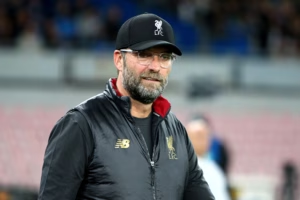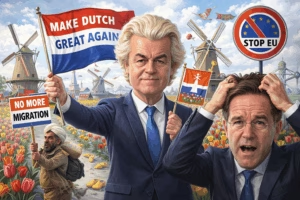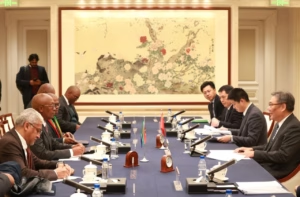The Dutch government has taken a noticeable step back in its standoff with China over semiconductor firm Nexperia, signalling a possible pathway toward stabilising a dispute that has unsettled parts of the global chip supply chain. The decision follows weeks of heightened diplomatic exchanges, international concern, and mounting pressure to safeguard the flow of critical technology.
After a period marked by friction and competing political interests, the Dutch government confirmed that it would suspend its special intervention at Nexperia. Economy Minister Vincent Karremans announced this shift in tone on his official X account, noting that recent developments had opened a narrow window for progress.
In his statement, Karremans said,
“In light of recent developments, I consider it the right moment to take a constructive step by suspending my order under the Goods Availability Act regarding Nexperia, in close consultation with our European and international partners.”
The announcement marks the first public indication that dialogue between the two countries may be easing some of the strain created by earlier Dutch actions. Karremans acknowledged the steps taken by Beijing so far, stating,
“We are positive about the measures already taken by the Chinese authorities to ensure the supply of chips to Europe and the rest of the world.”
He added that the Netherlands is committed to continued engagement, saying,
“We will continue to engage in constructive dialogue with the Chinese authorities in period ahead.”
The dispute originated in September when the Dutch government moved to take control of Nexperia from its parent company, Wingtech Technology, citing economic security risks. This intervention included suspending the company’s chief executive, Zhang Xuezheng. Officials argued that the geopolitical sensitivity of semiconductor production required stronger oversight, especially given Europe’s strategic concerns about supply chain vulnerabilities.
These actions were swiftly criticised by several Chinese government bodies. Agencies including the Ministry of Foreign Affairs and the Ministry of Commerce repeatedly accused the Netherlands of disrupting a business built on global cooperation. They criticised the move as interference and warned that it risked fracturing a supply chain already under strain. Beijing urged Dutch authorities to reverse course and pursue what they described as more constructive and market-based solutions to the Nexperia issue.
As the disagreement escalated, both sides began exploring ways to de-escalate the matter. On November 8, the Ministry of Commerce in China disclosed that it had approved a request from the Netherlands for a formal visit to Beijing to continue discussions. This approval was interpreted as a willingness by China to participate in a more structured negotiation process.
Following this approval, Minister Karremans confirmed days later that a high-level Dutch delegation would travel to China early the following week to seek common ground on Nexperia, as reported by Reuters. It marked the most significant diplomatic movement since the conflict began.
During a regular press conference on November 13, Ministry of Commerce spokesperson He Yadong reiterated China’s position. He emphasised that Beijing had maintained what he described as a responsible stance aimed at protecting global semiconductor stability. He said China had participated in several rounds of talks and welcomed further discussion with the Dutch side.
He Yadong also stressed the urgency of finding a resolution, stating that China expects meaningful cooperation from the Netherlands. According to He, China hopes the Dutch government will demonstrate commitment, advance substantive proposals, and take steps that contribute to steadying the global semiconductor chain.
Although the dispute remains unresolved, the decision to suspend the Dutch intervention introduces a new diplomatic opening at a time when global chip supply chains are heavily scrutinised. Analysts note that any progress between the two countries could influence broader European approaches to balancing economic security with technological dependence.
The Dutch government’s move suggests that it may be seeking a negotiated outcome rather than a prolonged confrontation. At the same time, China’s insistence on stability within the semiconductor ecosystem indicates its interest in preventing further disruptions that could spill over into its domestic industries and global markets.
As negotiations continue, both sides face pressure to balance security concerns with the practical realities of a deeply interconnected global chip industry. The coming talks in Beijing will likely determine whether this suspension becomes a turning point or merely a temporary pause in a complex geopolitical dispute.

















